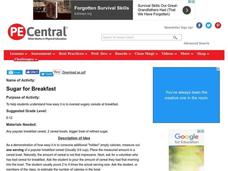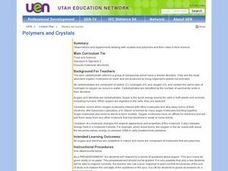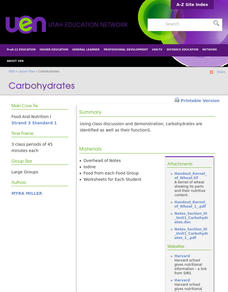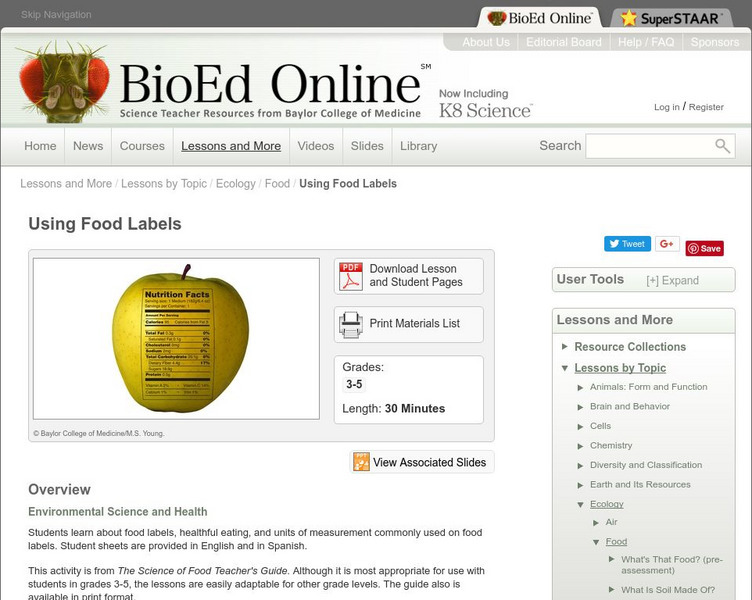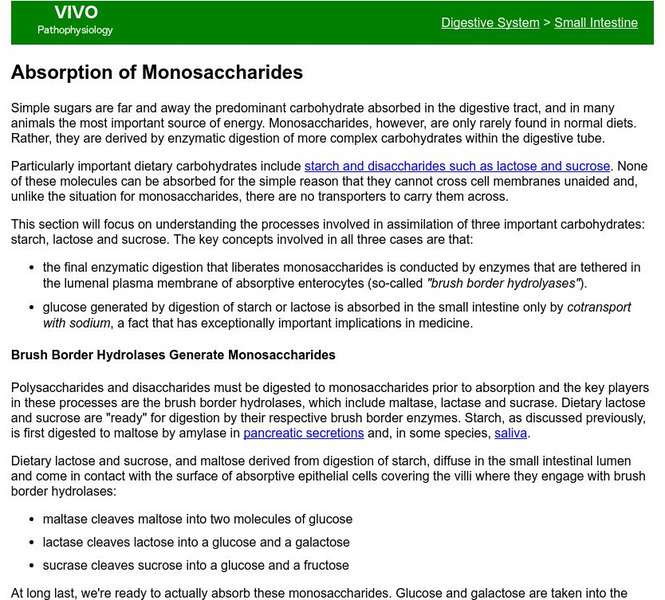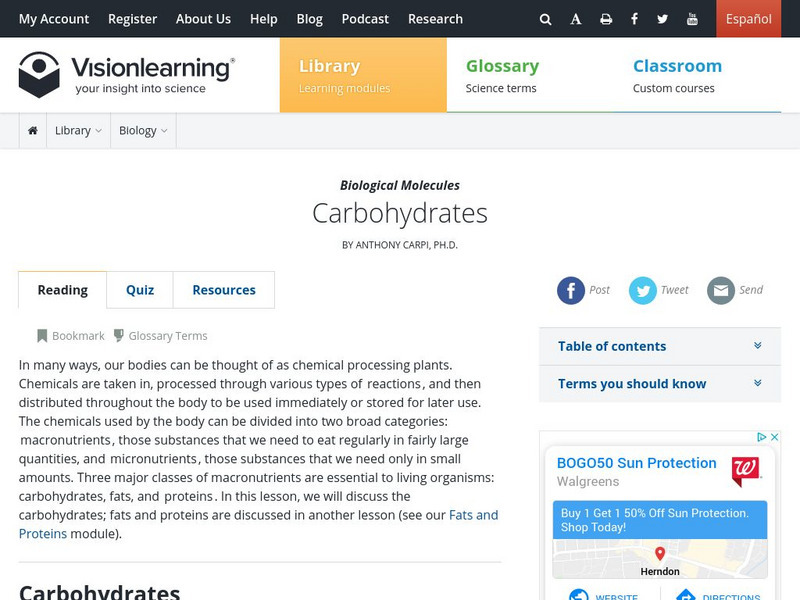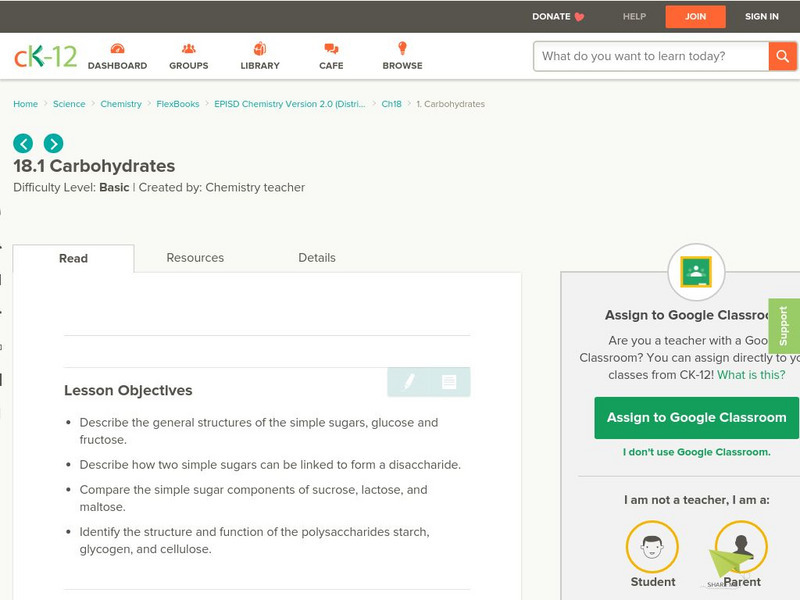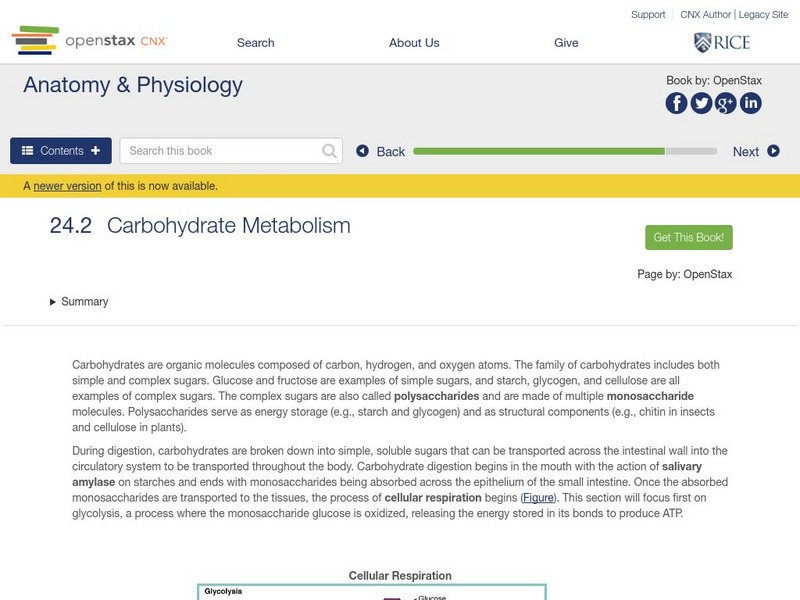Curated OER
Diet and Nutrition
Young scholars figure out the nutritional values of foods to explain the nature of a healthy diet by looking at fast food nutrition pamphlets and calculating the values of foods then comparing them to the food pyramid.
Curated OER
What's Happening to Your Body
Students list the types of biological development that occur during adolescence and the nutritional, physical, and mental needs that support that development. They describe careers in the field of adolescent health.
Curated OER
Sugar for Breakfast
Students calculate the calories and carbohydrates in breakfast cereals. They learn the nutritional value of sugar-filled cereals. They can also figure out the nutritional value of other breakfast items, such as toast, orange juice, etc ....
Curated OER
Carbohydrates, Proteins, and Fats
Young scholars describe the properties of carbohydrates, proteins and fats. In this health science lesson, students identify food sources where these nutrients can be found. They explain how they affect our body.
Curated OER
MacroMolecules
This single slide displays the discussion points to differentiate between the main molecules ; structure/function/classes/lab test/common examples
Curated OER
Polymers and Crystals
Learners experiment with crystals and polymers and examine their roles in food science.
Curated OER
Get Fit for Yosemite - Nutrition
Students demonstrate an understanding of healthy eating habits and of following a fitness program. They visit Yosemite Institute.
Curated OER
Carbohydrates
Students listen to a lecture on carbohydrates focusing on the differences between complex and simple carbohydrates. They complete a demonstration and worksheet.
Curated OER
Dribbling for Nutrition
Students practice reading food labels and determining the correct number of grams of fat and carbohydrates in a single serving. They work on improving dribbling skills during the task.
Aetna Intelihealth
Aetna: Inteli Health: Hypoglycemia
Thorough overview of this condition often associated with diabetes. Includes information on symptoms, treatment, prevention, and more.
eSchool Today
E School Today: Your Revision Notes on the Nutrients in Food
Discusses food, why we need it, and the types of nutrients that food for humans must have.
Harvard University
Harvard School of Public Health: Carbohydrates
This public health resource provides information on carbohydrates. Very in-depth, discussing what carbohydrates are, how they work, and popular diets related to carbohydrates.
University of Oxford (UK)
University of Oxford: Lipids and Carbohydrates
In this chapter the role lipids and carbohydrates play in living organisms is examined.
BioEd Online
Bio Ed Online: Using Food Labels
Do you know how to read a food label? Food labels provide important information about the nutritional value of foods. In this lesson plan students will learn about food labels, healthful eating, nutrition facts, and units of measurement...
Colorado State University
Colorado State University: Absorption of Monosaccharides
Page focuses on the processes involved in the generation of monosaccharides and their absorption into the digestive tract. Image shows the transport of glucose across the intestinal epithelium.
Vision Learning
Visionlearning: Biological Molecules: Carbohydrates
An explanation of why carbohydrates are important nutrients for the human body. Chemical formulas and structures are used to demonstrate simple and complex carbohydrates.
Harvard University
Harvard School of Public Health: The Nutrition Source
The Department of Nutrition at the Harvard School of Public Health offers this valuable resource. The latest medical research is presented on topics including fiber, carbohydrates, fats, alcohol, healthy weight, and much more.
University of Hamburg
University of Hamburg: Polysaccharides
Brief description of polysaccharides includes definition, chemical composition, and formation.
CK-12 Foundation
Ck 12: Carbohydrates
[Free Registration/Login may be required to access all resource tools.] This activity covers the structure and function of carbohydrates. Students will learn about the different types of complex carbohydrates and how they are formed.
CK-12 Foundation
Ck 12: Carbohydrates
[Free Registration/Login may be required to access all resource tools.] Students investigate the general structures of the simple sugars, glucose and fructose, and find out how two simple sugars can be linked to form a disaccharide. They...
Khan Academy
Khan Academy: Biology: Macromolecules: Carbohydrates
An article that covers the structure and properties of carbohydrates.
CPALMS
Florida State University Cpalms: Florida Students: Macromolecules of Life: The Overview
Get a tour of the four basic biological macromolecules structure and function in this tutorial. Learn about carbohydrates, lipids, proteins, and nucleic acids.
Curated OER
Kids Health: Figuring Out Fat and Calories
Most people know that fats and calories are connected to our weight, but what is their correlation? This article analyzes their relationship and how an understanding of these items can benefit your body. Links to related articles are...
OpenStax
Open Stax: Anatomy & Physiology: Carbohydrate Metabolism
Students understand the process of carbohydrate metabolism, and the chemical processes involved in this aspect of digestion.




